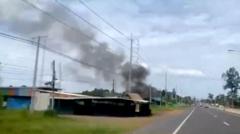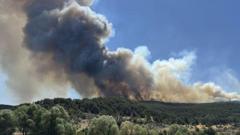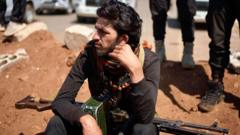Clashes have left at least 12 dead, primarily civilians, marking a significant escalation of a long-standing border dispute.
Tensions Escalate as Military Clashes Claim Lives on Thailand-Cambodia Border

Tensions Escalate as Military Clashes Claim Lives on Thailand-Cambodia Border
Severe military confrontations between Thailand and Cambodia result in multiple casualties, leading to heightened tensions between the neighboring countries.
The article text:
Clashes along the disputed border between Thailand and Cambodia have resulted in the deaths of at least 12 individuals, as confirmed by Thai authorities. This conflict represents a severe aggravation of tensions that have persisted between the two Southeast Asian nations for over a century. Most casualties are reported to be civilians from three Thai provinces, while the Cambodian side has yet to announce any casualties.
The fighting intensified on Thursday when both countries exchanged gunfire, with each side blaming the other for initiating hostilities. Thailand accused Cambodia of launching rockets, prompting air strikes on Cambodian military installations. In response, Thailand has closed its border with Cambodia, while Cambodia has downgraded its diplomatic ties, condemning Thailand for alleged "excessive force."
In an effort to protect civilians, both governments have issued evacuation advisories for their border areas, with approximately 40,000 residents in Thailand being relocated to safer locations. Sutian Phiwchan, a local from Buriram province near the border, described the situation as dire, stating, "[The fighting] is really serious. We're in the middle of evacuating."
Authorities in Thailand revealed that the toll of the conflict includes 11 civilians—among them an eight-year-old and a 15-year-old—as well as one military personnel. The conflicting narratives from both nations provide insight into the ongoing dispute, with Thailand asserting that the conflict began when Cambodian forces deployed drones for surveillance, while Cambodia claims that Thai soldiers violated previous agreements by encroaching on a Khmer-Hindu temple near the border.
Historical context reveals that the conflict traces back over a century to the drawing of national borders post-French colonization of Cambodia. Tensions flared in 2008 when Cambodia sought to designate an ancient temple in the contested region as a UNESCO World Heritage Site, leading to fierce opposition from Thailand. Sporadic clashes have since occurred, claiming lives on both sides.
Recent escalations began in May following the death of a Cambodian soldier, further straining bilateral relations. In the past months, both countries have imposed border restrictions, including bans on Thai imports and heightened troop presence. The acting premier of Thailand, Phumtham Wechayachai, stated that the situation is "delicate" and needs careful handling in compliance with international law.
Meanwhile, Cambodian Prime Minister Hun Manet expressed the desire for a peaceful resolution but stated the necessity of responding to "armed aggression." Although the current conflict does not appear likely to escalate into an all-out war, both nations are suffering from weak leadership capable of navigating the situation. As Hun Manet is establishing his authority, and Thaksin Shinawatra navigates a fragile coalition in Thailand, resolving these tensions remains a critical challenge for both countries.
Additional reporting by May Titthara in Phnom Penh.
Clashes along the disputed border between Thailand and Cambodia have resulted in the deaths of at least 12 individuals, as confirmed by Thai authorities. This conflict represents a severe aggravation of tensions that have persisted between the two Southeast Asian nations for over a century. Most casualties are reported to be civilians from three Thai provinces, while the Cambodian side has yet to announce any casualties.
The fighting intensified on Thursday when both countries exchanged gunfire, with each side blaming the other for initiating hostilities. Thailand accused Cambodia of launching rockets, prompting air strikes on Cambodian military installations. In response, Thailand has closed its border with Cambodia, while Cambodia has downgraded its diplomatic ties, condemning Thailand for alleged "excessive force."
In an effort to protect civilians, both governments have issued evacuation advisories for their border areas, with approximately 40,000 residents in Thailand being relocated to safer locations. Sutian Phiwchan, a local from Buriram province near the border, described the situation as dire, stating, "[The fighting] is really serious. We're in the middle of evacuating."
Authorities in Thailand revealed that the toll of the conflict includes 11 civilians—among them an eight-year-old and a 15-year-old—as well as one military personnel. The conflicting narratives from both nations provide insight into the ongoing dispute, with Thailand asserting that the conflict began when Cambodian forces deployed drones for surveillance, while Cambodia claims that Thai soldiers violated previous agreements by encroaching on a Khmer-Hindu temple near the border.
Historical context reveals that the conflict traces back over a century to the drawing of national borders post-French colonization of Cambodia. Tensions flared in 2008 when Cambodia sought to designate an ancient temple in the contested region as a UNESCO World Heritage Site, leading to fierce opposition from Thailand. Sporadic clashes have since occurred, claiming lives on both sides.
Recent escalations began in May following the death of a Cambodian soldier, further straining bilateral relations. In the past months, both countries have imposed border restrictions, including bans on Thai imports and heightened troop presence. The acting premier of Thailand, Phumtham Wechayachai, stated that the situation is "delicate" and needs careful handling in compliance with international law.
Meanwhile, Cambodian Prime Minister Hun Manet expressed the desire for a peaceful resolution but stated the necessity of responding to "armed aggression." Although the current conflict does not appear likely to escalate into an all-out war, both nations are suffering from weak leadership capable of navigating the situation. As Hun Manet is establishing his authority, and Thaksin Shinawatra navigates a fragile coalition in Thailand, resolving these tensions remains a critical challenge for both countries.
Additional reporting by May Titthara in Phnom Penh.




















